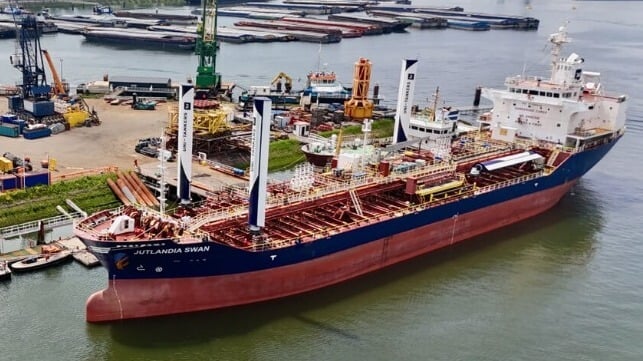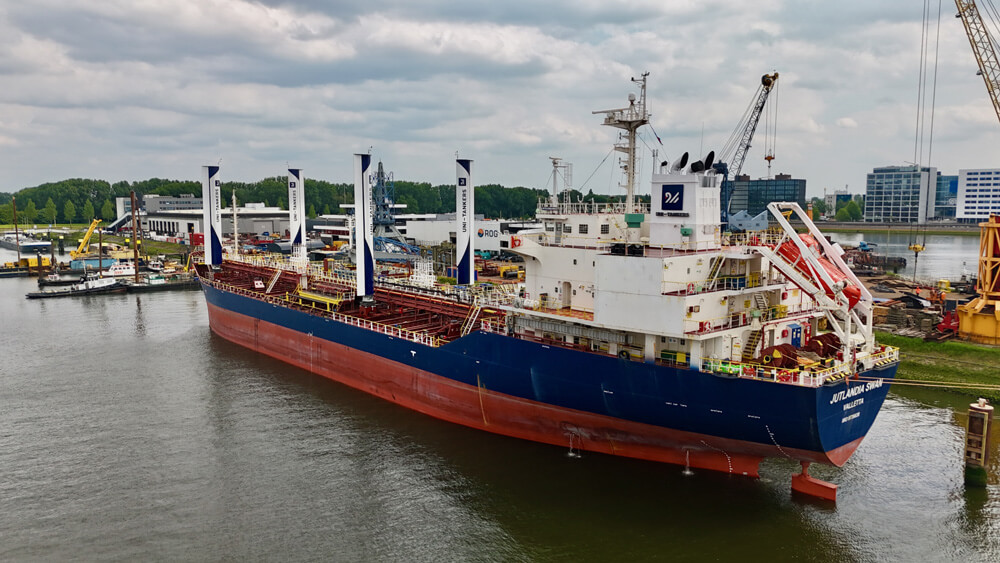Uni-Tankers Hoists Sails for Danish Research on Wind Propulsion

Denmark’s Cleanship project is moving into its operational stage as it begins to test the real effect of wind sails on an in-service product tanker. The goal of the project is to provide insights into the actual performance using a 12,500 dwt tanker, Jutlandia Swan operated by Uni-Tankers.
The product tanker, which was built in 2015 and sails under the flag of Malta, was recently fitted with four VentoFoils. The vertical rigid sails are one of the technologies that have been developed for wind-assisted propulsion. This application was developed by Econowind, which was launched in 2016 and has successfully installed versions of its rigid sails on a number of vessels.
The Cleanship project is running between 2024 and 2026 supported by the Danish Environmental Protection Agency and led by the Denmark Technological Institute. Its goal is to collect more precise data on the effect of wind sails in operation and to provide a better basis for the shipping industry to evaluate the technologies. The project, which is also working to document the effect of biofuels and analyze operational strategies, is in collaboration with Uni-Tankers, Green Instruments, Maersk Mc-Kinney Møller Center for Zero Carbon Shipping, Danish Shipping Companies, and Danish Maritime.
“It is an important milestone for the Cleanship project that we are now entering a new phase,” says Julie Tølbøl Rasmussen, senior project manager at the Danish Technological Institute and the Cleanship project. “By measuring this technology, we can provide insight into the effect of energy-efficient solutions on board ships under real-world conditions.”

The 10-year-old product tanker will begin testing the sails under normal operating conditions (Denmark Technological Institute)
The Jutlandia Swan is 407 feet in length (124 meters) and was fitted with four of the rigid sails. They are paired forward and aft on each side of the vessel. The sails can also be folded down when not in use.
"Wind-assisted propulsion has clear potential, but its real value depends on how well it is integrated into daily operations. Now we have the opportunity to test how these sails behave at sea, what they mean for fuel efficiency, and how the crew can work with them in practice," says Kristian Larsen, Technical Director at Uni-Tankers.
The company is placing a great emphasis on crew involvement highlighting that new technologies only create results when it is understood and supported by the crew. Uni-Tankers is focusing on crew involvement and is in the process of developing training, maintenance, and operating procedures to ensure the crew can handle the sails safely and efficiently.
This project is the latest in a series of recent tests looking at the operational efficiency of wind-assisted propulsion. Results were released for the first two years of operation of the Ro-Ro supported the Ariane rocket program reporting that the vessel Canopée saved 1.3 tonnes of fuel per day under normal operating conditions, corresponding to approximately 300 kW of equivalent engine power per wing sail, or a total of 5.2 tonnes of fuel (20.8 tonnes CO2 equivalent) per day.
The positive results of these early tests are helping to build momentum for more vessels to adopt wind-assisted propulsion as the industry works to meet the IMO goals to reduce emissions and increase efficiency.
